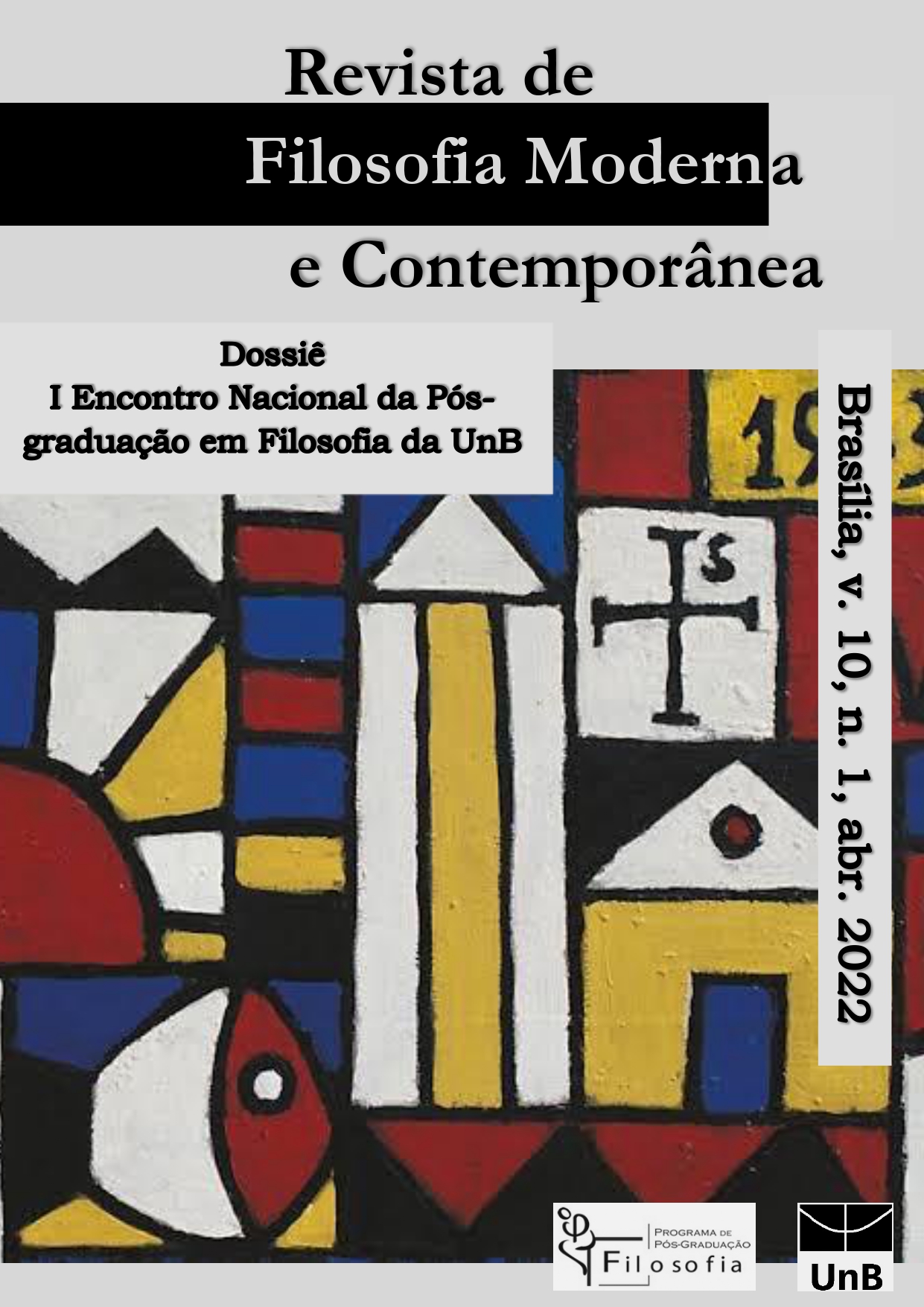Loparic's Semantics of Concepts on Kant's "Critique of Pure Reason"
Exposition, Critiques and Proposition (1st Part)
DOI:
https://doi.org/10.26512/rfmc.v10i1.43331Keywords:
Transcendental Semantics. Semantics of Concepts. Logic. Formal Sciences. Metalanguage.Abstract
This work aims to make a critical and propositional exposition about the semantics of concepts in general, from the book Transcendental semantics of Kant (2000), by Loparic. In general terms, the exposition of the theme, by this author, focused on the general classification of the semantics of concepts, their meanings and referents. In turn, the critics was directed to several aspects of its exposition, such as: the precision of the nomenclature used, the introduction of new definitions and the correction of others, the reformulation of the classification of the semantics of the concepts. Finally, the proposition highlighted three main points: (i) the conception of the equivalent epistemological status between logic and mathematics, as symbolic sciences with their own form and content; (ii) the weak and strong concept of sciences in general (formal and empirical) as pure and applied sciences, respectively; (iii) the possible metalinguistic conception of the semantics of concepts.
Downloads
References
AGOSTINHO, S. Confissões. São Paulo: Ed. Nova Cultural, 1984.
ARISTÓTELES. Física: Libros III-IV. Buenos Aires: Ed. Biblos, 1995.
BLANCHÉ, R. História da lógica de Aristóteles a Bertrand Russell. Lisboa: Ed. 70, 1985.
COHEN, H. La théorie kantienne de l’expérience. Paris: Ed. CERF, 2001.
DA COSTA, Newton e KRAUSE, Décio. O que é lógica. Fundamento, Florianópolis, n. 10, p. 11-19, Jan. 2015, 2015.
EVES, H. (2004). Introdução à história da matemática. Campinas: Ed. UNICAMP.
GOLDSTEIN, R. Incompletude: a prova e o paradox de Kurt Gödel. São Paulo: Ed. Companhia das Letras, 2008.
HAACK, S. Filosofia das lógicas. São Paulo: Ed. UNESP, 2002.
HANNA, R. Kant e os fundamentos da filosofia analítica. São Leopoldo (RS): ED. Unisinos, 2005.
HEIDEGGER, M. Ser e tempo. Petrópolis (RJ): Ed. Vozes, 2014.
______________. Kant y el problema de la metafísica. México: Fondo de Cultura Económica, 1996.
HUME, D. Investigação acerca do entendimento humano. (1989). São Paulo: Ed. Nova Cultural (Col. Os Pensadores), 1989.
________. Tratado da natureza humana, São Paulo: Ed. UNESP, 2001.
KANT, I. Gesammelten Werken der Akademie ausgabe aus den Bänden 1-23 (Elektronische Edition). Band III: Kritik der reinen Vernunft (2. Aufl. 1787). Band IV: Kritik der reinen Vernunft (1. Aufl. 1781), Prolegomena und Metaphysische Anfangsgründe der Naturwissenschaft (1786). Band IX: Logik (1800). Band X: Briefwechsel (2. Aufl. 1747-1788). Seit 2008 in: https://korpora.zim.uni-duisburg-essen.de/kant/ verzeichnisse-gesamt.html.
______. Crítica da razão pura. São Paulo: Ed. Nova Cultural. (Os Pensadores), 1980.
______. Crítica da razão pura. Petrópolis (RJ): Ed. Vozes, 2012.
______. Kritik der reinen Vernunft. Frankfurt: Suhrkamp, 1997.
______. Prolegômenos a toda metafísica futura. Lisboa: Ed. 70, 1988.
______. Lógica. Rio de Janeiro: Ed. Tempo Brasileiro, 1992.
LOCKE, J. São Paulo: Ed. Nova Cultural. (Os Pensadores), 1988.
LOPARIC, Z. A semântica transcendental de Kant. Campinas: UNICAMP, 2000.
_________. Heurística kantiana. Cadernos de História e Filosofia da Ciência. Campinas: UNICAMP, pp. 73-89, 1983.
LORENZO, J. Kant y la matemática: el uso constructivo de la razón pura. Madrid: Ed. Tecnos, 1992.
FEITOSA & PAULOVICH. Um prelúdio à lógica. São Paulo: Ed. UNESP, 2005.
FREGE, G. Lógica e filosofia da linguagem. São Paulo: Ed. Cultrix/EDUSP, 1978 [1892].
GENSLER, H. Introdução à lógica. São Paulo: Ed. Paulus, 2016.
LUKASIEWICZ, J. La silogística de Aristóteles: desde el punto de vista de la lógica formal moderna. Madrid: Ed. Tecnos, 1977 [1954].
MORTARI, C. Introdução à lógica. São Paulo: Ed. UNESP, 2001.
NAGEL, E. Prova de Gödel. São Paulo: Ed. Perspectiva, 1973.
POPPER, K. Conjecturas e refutações. Lisboa: Ed. 70, 2018.
QUINE, W. Filosofia da Lógica. Rio de Janeiro: Ed. Zahar, 1972.
RYLE, G. Formal and informal logic. (In: Dilemmas). United Kingdom: Cambridge Univ. Press, 1954.
SHANNON, C. A symbolic analysis of relay and switching circuits (e-version). 72 f. Dissertation (Master of Science) – Massachusetts Institute Technology, Cambridge (EUA). In: https://dspace.mit.edu/handle/1721.1/11173,1936.
SOUZA, L. As interpretações de Cohen e Heidegger sobre a ‘Crítica da razão pura’ de Kant. (2007). Tese (Doutorado em Filosofia) – Faculdade de Filosofia, Universidade Federal de Minas Gerais, Belo Horizonte, 2007.
_________. A semântica em Kant, Loparic e Tarski. In: I Colóquio Kant e o Kantismo, 2009, Belém. [Anais eletrônicos do I Colóquio Kant e o Kantismo]. Belém: UFPA, pp. 1-16. CD-ROM. In: https://sigaa.ufpa.br/sigaa/public/docente/producao.jsf?siape=1152682, 2011.
_________. A concepção de sistema em Kant e Fichte. Studia Kantiana, Santa Maria (RS), Nº 18, pp. 112-133, Jul-Dez 2015. Disponível em: <http://www.sociedadekant.org/studiakantiana/index.php/sk/article/view/208/18>, 2015.
_________. Notas sobre a Estética Transcendental de Kant: intuição e aparecimento, forma e matéria. Série 2, Vol. 12, Nº 2 (especial), pp. 68-113, Mai-Ago., 2017.
_________. Problemas lógicos das refutações do idealismo e das antinomias de Kant: sorites, petição de princípio e construtivismo. In: SOUZA, Jovelina (Org.). Dossiê de Pesquisa do PPGFIL-UFPA. Curitiba: Ed. CRV, pp. 121-139, 2021.
STRAWSON, P. The bounds of sense. London & New York: Ed. Methuen, 1973.
TARSKI, A. O conceito de verdade nas linguagens formalizadas. In: A concepção semântica da verdade. São Paulo: ED. UNESP, 2007 [1931].
__________. Verdade e demonstração. In: A concepção semântica da verdade. São Paulo: ED. UNESP, 2007 [1969].
TEIXEIRA, J. Mente, cérebro e cognição. Petrópolis (RJ): Ed. Vozes, 2000.
WITTGENSTEIN, L. Tractatus Logico-Philosophicus. São Paulo: Ed. USP, 1994.
Downloads
Published
How to Cite
Issue
Section
License
Copyright (c) 2022 Journal of Modern and Contemporary Philosophy

This work is licensed under a Creative Commons Attribution-NonCommercial-NoDerivatives 4.0 International License.
Copyright for articles published in this journal is retained by the authors, with first publication rights granted to the journal. By virtue of their appearance in this open access journal, articles are free to use, with proper attribution, in educational and other non-commercial settings.


